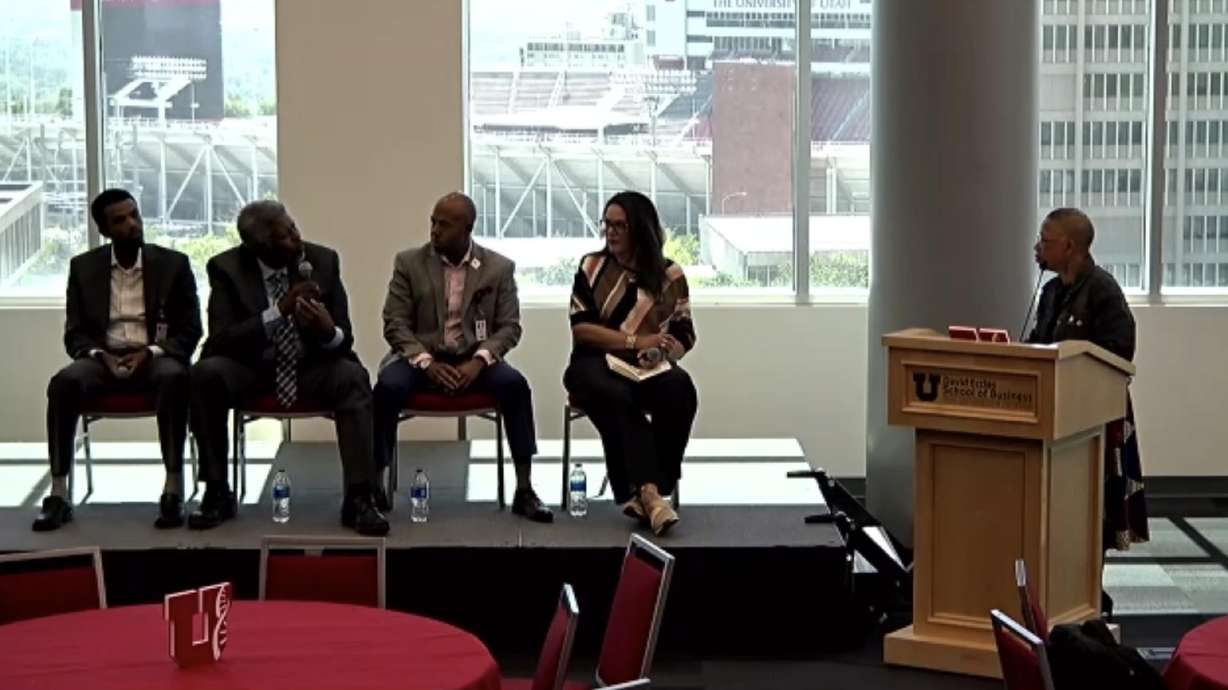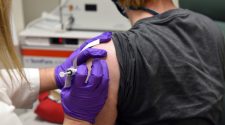A panel of health care professionals discuss racial biases in health and medicine. The panel was a part of Juneteenth Day of Freedom Summit held by the University of Utah on Wednesday. (Ashley Fredde, KSL.com)
Estimated read time: 4-5 minutes
SALT LAKE CITY — The diagnosis of his grandmother’s bladder cancer and her death propelled Dr. Richard Ferguson into medicine.
Ferguson’s grandmother had “smoked endlessly since her teenage years” but her grandson felt that her death was entirely preventable.
“I wanted to prevent other Black women like my grandmother from suffering and having an agonizing death from bladder cancer or other preventable diseases,” said Ferguson, chief medical officer for Health Choice Utah.
Ferguson shared his grandmother’s story as a panelist in a Juneteenth Day of Freedom Summit at the University of Utah on Wednesday. The discussion featured health care workers and educators from various backgrounds sharing where they believe racial bias occurs in health, medicine and research.
Like Ferguson, each shared what drove them to become involved in community health and addressing racial inequities. Many spoke of witnessing family members attempt to navigate the health care system or treatment within the system.
Dr. Ivette Lopez, director at the Utah Area Health Education Centers, pointed to the death of her uncle in Puerto Rico early in the HIV epidemic as her entrance into public health. Another panelist, Dr. Clifton Sanders, said his involvement with the intersection of health disparities and medicine came after the death of his wife.
“It’ll be two years ago, in October, that I lost my wife to complications from systemic scleroderma and, terribly, it turns out that that women of African descent are at least twice as likely to get systemic scleroderma as as women of other groups,” said Sanders, provost for academic affairs at Salt Lake Community College.
Before her complications with systemic scleroderma, his wife struggled with hepatitis C, which was treated at a much lower success rate for Black women at the time. The prior lack of research revealing the genetic link between Black women and complications from various diseases highlights the racial bias that can be present in research.
“Most of the questions get framed by who’s there, and if we’re not there, the questions that are interesting to us may not get framed at all,” said Sanders. “When you’re being diagnosed and people are trying to make data-informed decisions, if you’re not part of that database … that’s a risk. “
Many of the panelists pointed to better representation in a variety of fields to improve racial bias in health, medicine and research. Increasing the number of health care workers from diverse backgrounds, integrating community health workers into the system and exposing students to patients of diverse backgrounds were named as solutions by the panel.
Intertwined with representation was the need for education, panelists said.
“When you think about Juneteenth and you think about what we’re commemorating, it’s really an acknowledgement of the lack of communication and information around the Emancipation Proclamation,” said Tawana Thomas Johnson, senior vice president and chief diversity officer with the American Cancer Society. “We are still in a situation where we find ourselves with Black and brown communities not getting the information that they need in order to have health equity — in order to have access to resources and services that other populations benefit from.”
Health disparities among different racial groups were especially highlighted amid the COVID-19 pandemic. Rates of vaccination among Hispanic and Black communities struggled, even as health organizations mobilized efforts with community health workers. Fear led to vaccine hesitancy, panelists said.
“One thing that I learned is you cannot approach it and/or gain trust if you don’t acknowledge people’s fear. You cannot shame them into making that decision; that will often lead to people closing off from you, shutting down,” said Sanders.
Understanding fears or perspectives stemming from historical events can help increase trust in health care professionals, the panel added.
“It’s the workforce piece, it’s recognizing the historical trauma that these communities have suffered and then it’s also leveraging trusted messengers to help build trust within the communities and to share information that will in many instances be life-saving for those communities,” said Thomas Johnson.
Increasing representation and education among health care workers and health care systems are just two ways of starting to address racial bias. Other solutions named by panelists included increasing access to insurance and health care, integrating cultural and language interpreters into patient care and teaching communities how to advocate for themselves in the system.
“I think we should start by acknowledging that health care systems cannot address this alone,” said Ferguson. “They themselves can’t undo the systemic effects of racism that are in health care right now. It’s going to take laws, just like there was often codification of racism going on for decades.”

















